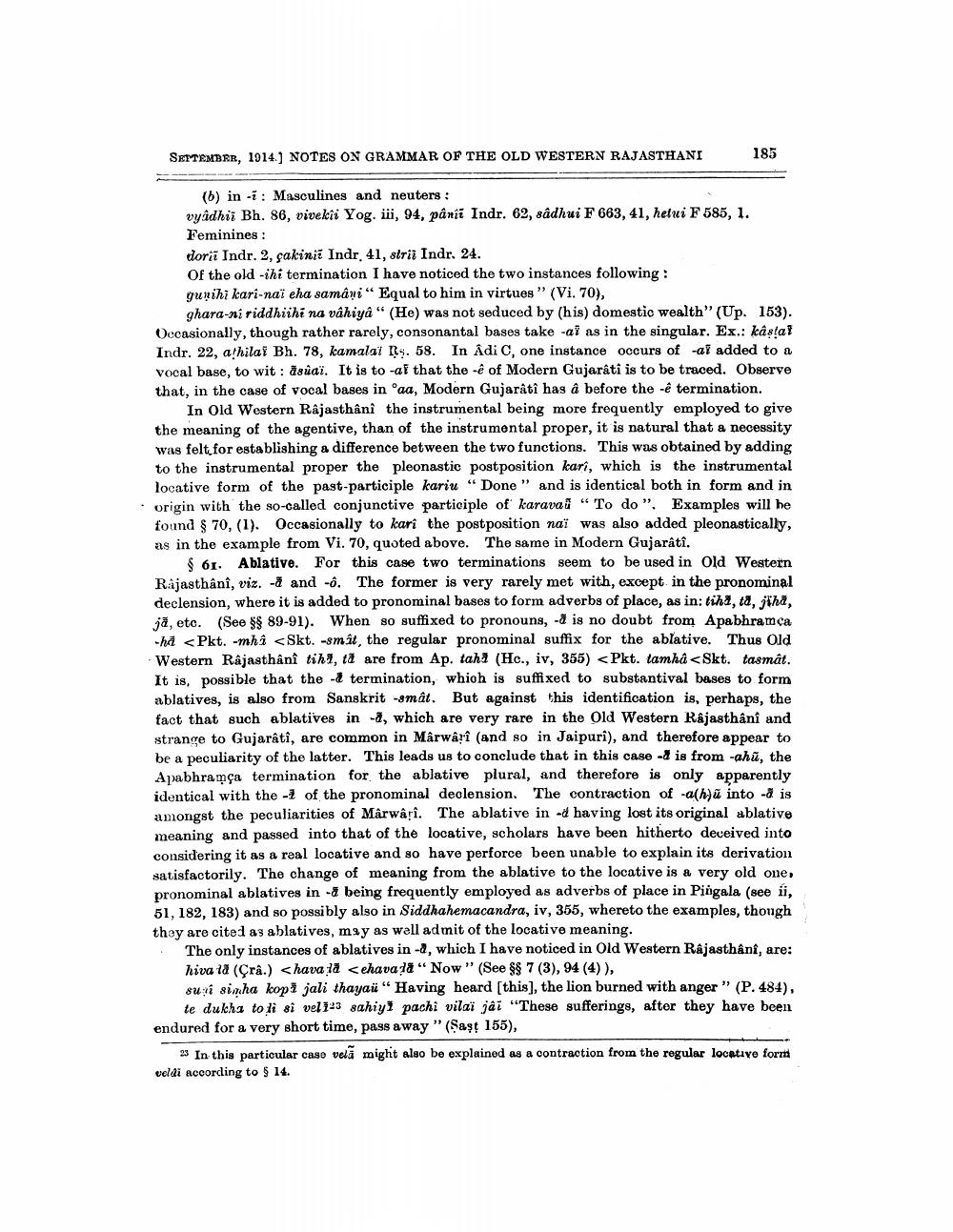________________
SEPTEMBER, 1914.] NOTES ON GRAMMAR OF THE OLD WESTERN RAJASTHANI
(b) in Masculines and neuters:
vyâdhii Bh. 86, vivekii Yog. iii, 94, pânii Indr. 62, sâdhui F 663, 41, hetui F 585, 1. Feminines:
dorii Indr. 2, çakini Indr, 41, strii Indr. 24.
Of the old -ihi termination I have noticed the two instances following:
185
gunihi kari-naï eha samâni" Equal to him in virtues" (Vi. 70),
ghara-ni riddhiihi na vâhiyâ“ (He) was not seduced by (his) domestic wealth" (Up. 153). Occasionally, though rather rarely, consonantal bases take al as in the singular. Ex.: kâṣṭał Indr. 22, athilal Bh. 78, kamalai Rs. 58. In Adi C, one instance occurs of -al added to a vocal base, to wit: asuaï. It is to -ai that the -ê of Modern Gujarati is to be traced. Observe that, in the case of vocal bases in 'aa, Modern Gujaratî has â before the -ê termination.
In Old Western Rajasthânî the instrumental being more frequently employed to give the meaning of the agentive, than of the instrumental proper, it is natural that a necessity was felt, for establishing a difference between the two functions. This was obtained by adding to the instrumental proper the pleonastic postposition kari, which is the instrumental locative form of the past-participle kariu "Done" and is identical both in form and in origin with the so-called conjunctive participle of karava "To do". Examples will he found § 70, (1). Occasionally to kari the postposition naï was also added pleonastically, as in the example from Vi. 70, quoted above. The same in Modern Gujarâtî.
§ 61. Ablative. For this case two terminations seem to be used in Old Western Rajasthânî, viz. - and -ô. The former is very rarely met with, except in the pronominal declension, where it is added to pronominal bases to form adverbs of place, as in: tiha, ta, jihā, jā, etc. (See §§ 89-91). When so suffixed to pronouns, - is no doubt from Apabhramça -ha <Pkt. -mhâ <Skt. -smât, the regular pronominal suffix for the ablative. Thus Old Western Rajasthânî tih, ta are from Ap. tah (Hc., iv, 355) <Pkt. tamhâ<Skt. tasmât. It is, possible that the - termination, which is suffixed to substantival bases to form ablatives, is also from Sanskrit -smât. But against this identification is, perhaps, the fact that such ablatives in -8, which are very rare in the Old Western Rajasthânî and strange to Gujarâtî, are common in Mârwârî (and so in Jaipuri), and therefore appear to be a peculiarity of the latter. This leads us to conclude that in this case - is from -ahu, the Apabhramça termination for the ablative plural, and therefore is only apparently identical with the - of the pronominal declension. The contraction of -a(h) into - is amongst the peculiarities of Mârwârî. The ablative in -d having lost its original ablative meaning and passed into that of the locative, scholars have been hitherto deceived into considering it as a real locative and so have perforce been unable to explain its derivation satisfactorily. The change of meaning from the ablative to the locative is a very old one, pronominal ablatives in - being frequently employed as adverbs of place in Pingala (see íi, 51, 182, 183) and so possibly also in Siddhahemacandra, iv, 355, whereto the examples, though they are cited as ablatives, may as well admit of the locative meaning.
The only instances of ablatives in -8, which I have noticed in Old Western Rajasthânî, are hiva la (Crâ.) <hava la <ehavala" Now" (See §§ 7 (3), 94 (4)),
sui simha kopi jali thayaü" Having heard [this], the lion burned with anger" (P. 484), te dukha to li si vel123 sahiyi pachi vilai jai "These sufferings, after they have been endured for a very short time, pass away" (Sast 155),
23 In this particular caso vela might also be explained as a contraction from the regular locative form veldi according to § 14.




